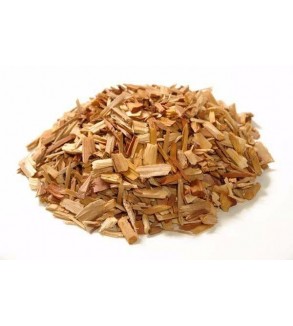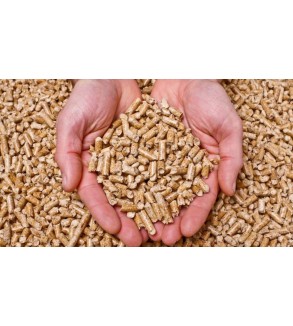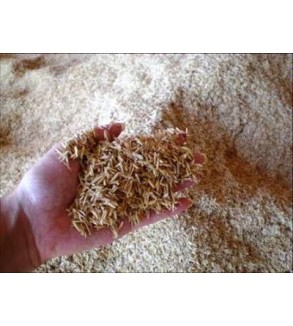
Biomass consumables
Biomass consumables refer to the materials and products used in biomass energy systems. These systems convert organic matter, such as wood, agricultural waste, and other biological materials, into thermal or electrical energy.
Ecological Firewood
Wood chips
Wood chips Biobrasa are a byproduct of the timber industry, resulting from the processing of wood in sawmills and furniture factories. They consist of small pieces and chips of wood that are generated during the cutting, sanding and other wood processing operations. Wood chips have several applications and benefits, including:
Wood Panel Production: Wood chips are often used in the manufacture of particleboard, MDF (Medium Density Fiberboard) and OSB (Oriented Strand Board). These panels are widely used in construction, furniture and other applications.
Fuel: Wood chips can be used as fuel in boilers to generate heat and power. They are a renewable energy source and can be used in residential and industrial heating systems.
Pellet Production: Wood chips can be compressed to produce wood pellets, which are a dense and efficient form of fuel. Pellets are used in greenhouses and boilers for heating.
Fertilizer and Soil Improvement: Wood chips can be composted and used as organic fertilizer to improve soil fertility. It helps increase organic matter and water retention in the soil.
Landscaping: Wood chips can be used as ground cover in gardens and landscaping areas. It helps control weeds, retain moisture and improve aesthetic appearance.
Paper Production: Wood chips can be processed to produce wood pulp, which is used in paper manufacturing.
Construction Materials: Wood chips can be used in the production of construction materials such as eco-bricks and other composite products.
Biofuel Production: Wood chips can be used as a raw material for the production of biofuels such as cellulosic ethanol.
Wood chips are a valuable resource that can be utilized in many ways, contributing to sustainability and the circular economy. Their efficient use helps reduce waste and maximize the value of natural resources. B
Wood pellets Biobrasa
Wood pellets Biobrasa
Wood pellets are small, compacted cylinders made from wood waste such as sawdust, shavings and chips. They are produced through a compression process that transforms the waste into a dense, uniform form, making it easier to transport, store and use as fuel. Wood pellets have a variety of applications and benefits, including:
Applications
Residential and Commercial Heating:
Stoves and Boilers: Wood pellets are often used in stoves and boilers to heat homes and commercial buildings.
Fireplaces: There are pellet-specific fireplaces that offer an efficient and environmentally friendly alternative to traditional fireplaces.
Energy Production:
Cogeneration: Wood pellets can be used in cogeneration systems to produce heat and electricity simultaneously.
Biomass Plants: They are used in biomass power plants to generate electricity on a large scale.
Industry:
Industrial Processes: Wood pellets can be used as fuel in industrial processes that require heat, such as drying wood and producing steam.
Benefits
Energy Efficiency:
High Calorific Value: Wood pellets have a high calorific value, which means they can generate a large amount of heat with a small amount of fuel.
Low Moisture: The low moisture content of pellets improves combustion efficiency and reduces smoke emissions.
Sustainability:
Renewable: Wood pellets are made from wood waste, which is a renewable energy source.
Waste Reduction: Pellet production helps reduce wood waste, contributing to the circular economy.
Ease of Storage and Transportation:
Density: The compact shape of pellets makes them easy to store and transport.
Uniformity: The uniformity of pellets ensures consistent and efficient combustion.
Economical:
Cost-Effective: Wood pellets can be a more economical option compared to other fuels, such as oil and gas.
Price Stability: Wood pellet prices tend to be more stable compared to fossil fuels.
Considerations
Pellet Quality:
Certification: It is important to choose certified pellets that meet quality standards, such as ENplus or DINplus certificates.
Composition: High-quality pellets are made from pure wood, without additives or contaminants.
Equipment:
Stoves and Boilers: It is necessary to use specific equipment for wood pellets to ensure efficient and safe combustion.
Maintenance: Pellet burning equipment requires regular maintenance to ensure its performance and safety.
Storage:
Dry Place: Wood pellets should be stored in a dry place to avoid moisture absorption, which can affect their combustion efficiency.
Wood pellets are an efficient and sustainable solution for heating and energy production, offering an environmentally friendly alternative to fossil fuels.
Rice husk biobrasa
Rice husk, also known as rice bran, is a byproduct of rice milling. It is mainly composed of the outer layer of the rice grain, which is removed during the polishing process to produce white rice. Rice husk has several applications and benefits, including:
Fuel: Rice husk is often used as fuel in boilers to generate heat and power. It has a high calorific value and is a renewable energy source.
Compost and Soil Improvement: Rice husk can be composted and used as organic fertilizer to improve soil fertility. It helps increase organic matter and water retention in the soil.
Growing Substrate: Rice husk can be used as a substrate for growing mushrooms and other plants.
Animal Feed: Although pure rice husk is not suitable for animal feed due to its low digestibility, it can be processed and mixed with other ingredients to produce animal feed.
Building Materials: Rice husk can be used in the production of building materials such as eco-bricks and building panels.
Water Filtration: Carbonized rice husk can be used as a filtration material to purify water, removing contaminants and heavy metals.
Silicon Production: Rice husk is rich in silica, which can be extracted and used in the production of silicon, an important material for the semiconductor industry and other technological applications.
Rice husk is a valuable resource that can be used in many ways, contributing to sustainability and the circular economy.
Free support line!
Orders support!
Working Days / Hours!




